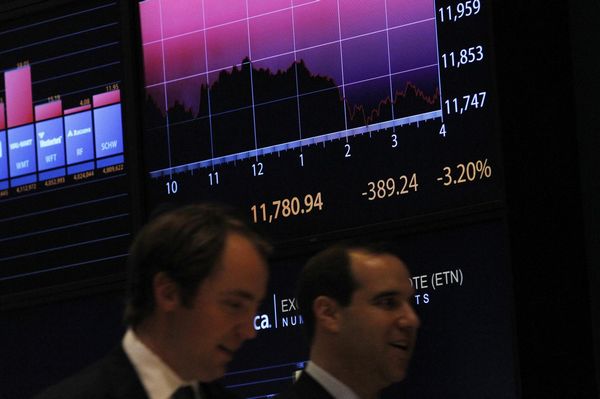Dow sinks 3% on Europe uncertainty
Updated: 2011-11-10 06:56
(Agencies)
|
|||||||||||
NEW YORK - Trouble on two fronts in Europe's debt crisis dragged the Dow Jones industrial average down 389 points Wednesday. The S&P 500 lost 3.7 percent, its biggest one-day drop since August, after Italy's borrowing costs soared and talks collapsed in Greece on forming a new government.
 |
|
A screen shows the Dow Jones industrial average on the floor of the New York Stock Exchange November 9, 2011.[Agencies] |
The euro dropped 2 percent against the dollar and Treasury yields sank as money moved out of Europe and traders bought US government bonds. Goldman Sachs, Morgan Stanley and other large banks were hit hard on worries over their ability to handle a financial crisis that might be brought on by trouble in Europe.
Only one stock in the S&P 500 rose: Best Buy Co. Inc., up 1.4 percent.
The yield on the benchmark Italian government bond spiked above 7 percent, evidence that investors are losing faith in the country's ability to repay its debt. Greece, Portugal and Ireland required financial rescues when their government bond yields rose above the same mark. Unlike those countries, Italy's $2.6 trillion in debt is too large for other European countries to rescue.
In Greece, power-sharing talks fell apart between the country's two main political parties, raising doubt about whether the country will be able to receive the next installment of emergency loans it needs to avoid default.
Italian Premier Silvio Berlusconi promised late Tuesday to step aside after a new budget is passed, but there are concerns that the transition to a new government will be difficult. Markets see Berlusconi as an impediment to the kind of far-reaching economic reforms Italy needs to remain solvent.
"The market loves a quick solution and we're obviously not getting one," said Mark Lehmann, director of equities of JMP Securities. "We've had a strong rally off the bottom and any piece of bad news is going to be responded to negatively."
The Dow sank 3.2 percent to close at 11,780.94, the biggest drop since Sept. 22.
The Dow fell 276 on Monday of last week and then 297 points the following day after the Greek prime minister said he would put an unpopular package of austerity cuts to a public vote. That raised the prospect that the measures would fail and Greece would default. The referendum was later scrapped. The Dow gained back nearly all that ground over the following five days.
The S&P 500 lost 46.82 points, or 3.7 percent, to 1,229.10.
The Nasdaq composite slid 105.84, or 3.9 percent, to 2,621.65. Both the S&P 500 and the Nasdaq are below where they started the year. The Dow is still up 1.8 percent.
The slide was broad. Financial firms and material producers fell the most. Morgan Stanley plunged 8 percent and Goldman Sachs lost 7 percent.
In quarterly filings this week, Morgan Stanley reported that it had $1.79 billion in exposure to Italy. Goldman Sachs Group Inc. said it had $2.4 billion in loans and other liabilities to Greece, Italy and other heavily indebted European countries. Goldman has a total of $28 billion exposed to all of Europe.
Markets fear that a chaotic default by either Greece or Italy would lead to huge losses for European banks. That, in turn, could cause a global lending freeze that might escalate into another credit crisis similar to the one in 2008 after Lehman Brothers fell.
European markets also fell sharply. Italy's benchmark index plunged 3.8 percent. Germany's DAX and France's CAC-40 each lost 2.2 percent.
A main cause of worry was a sharp increase in Italy's borrowing costs. The yield on the benchmark 10-year Italian government bond surged as high as 7.40 percent Wednesday, a gain of 0.82 percentage point from the previous day. It settled down to 7.25 percent later in the day, a level still considered unsustainable by economists.
Prices of assets seen as havens rose sharply. The dollar jumped 2 percent versus the euro. The yield on the benchmark 10-year Treasury note fell to 1.96 percent from 2.08 percent late Tuesday, a steep drop.
Nine stocks fell for every one that rose on the New York Stock Exchange. Trading volume was high at 4.6 billion shares.
Hot Topics
HIV/AIDS, Egypt protest, Thanksgiving, climate change, global economic recovery, home prices, high-speed railways, school bus safety, Libya situation, Weekly photos
Editor's Picks

|

|

|

|

|

|







